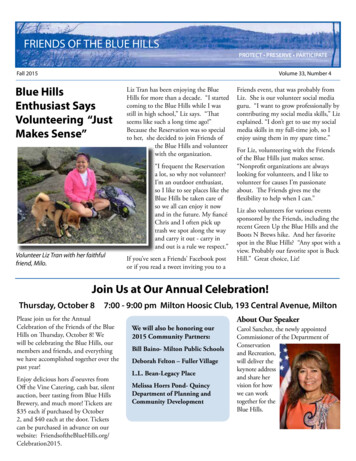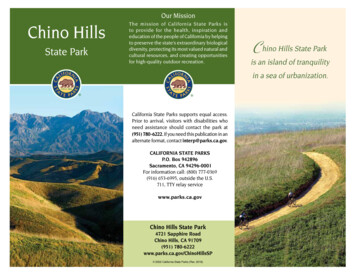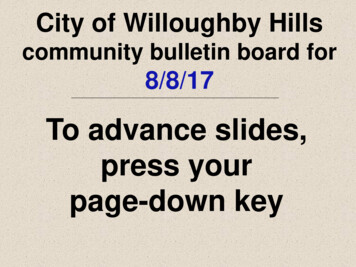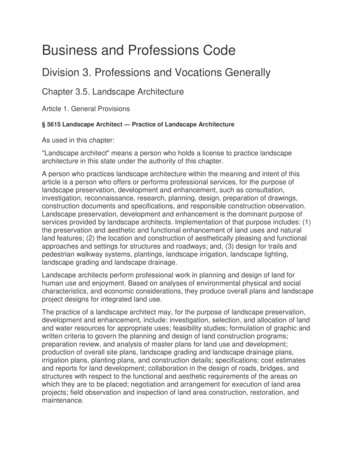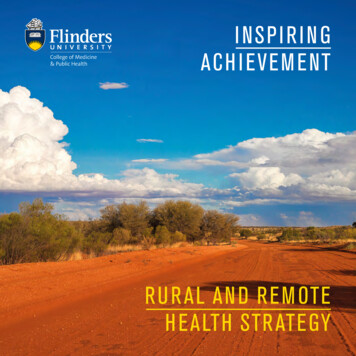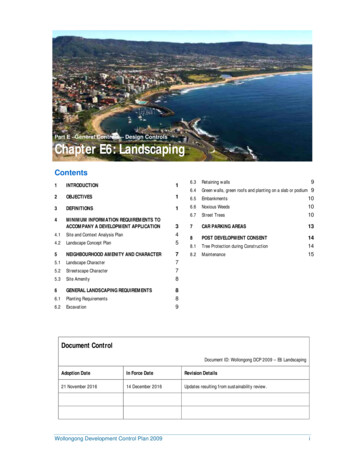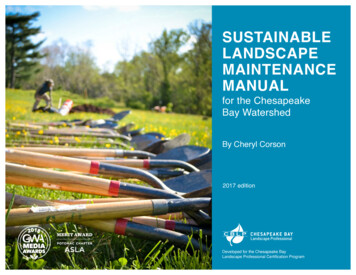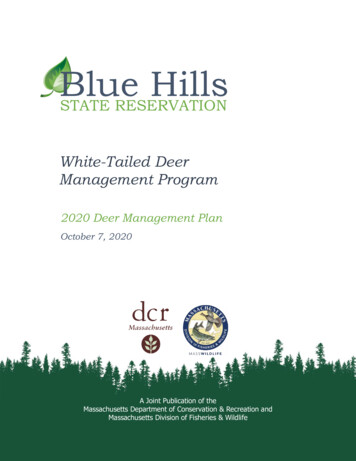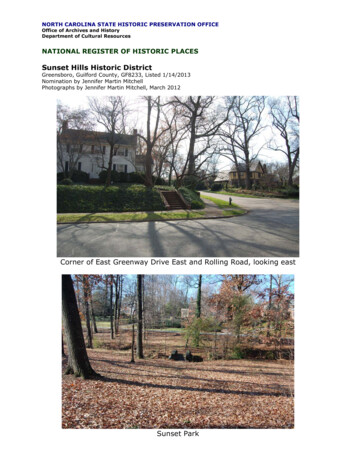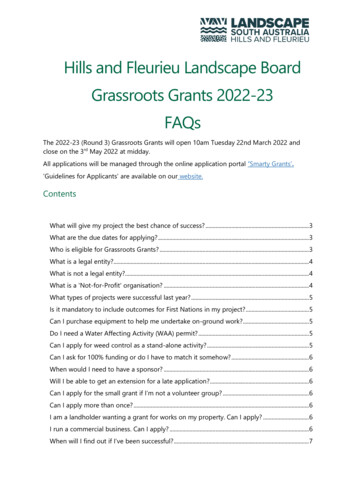
Transcription
Hills and Fleurieu Landscape BoardGrassroots Grants 2022-23FAQsThe 2022-23 (Round 3) Grassroots Grants will open 10am Tuesday 22nd March 2022 andclose on the 3rd May 2022 at midday.All applications will be managed through the online application portal ‘Smarty Grants’.‘Guidelines for Applicants’ are available on our website.ContentsWhat will give my project the best chance of success? . 3What are the due dates for applying? . 3Who is eligible for Grassroots Grants? . 3What is a legal entity?. 4What is not a legal entity?. 4What is a 'Not-for-Profit' organisation? . 4What types of projects were successful last year? . 5Is it mandatory to include outcomes for First Nations in my project? . 5Can I purchase equipment to help me undertake on-ground work?. 5Do I need a Water Affecting Activity (WAA) permit? . 5Can I apply for weed control as a stand-alone activity? . 5Can I ask for 100% funding or do I have to match it somehow? . 6When would I need to have a sponsor? . 6Will I be able to get an extension for a late application?. 6Can I apply for the small grant if I’m not a volunteer group? . 6Can I apply more than once? . 6I am a landholder wanting a grant for works on my property. Can I apply? . 6I run a commercial business. Can I apply? . 6When will I find out if I’ve been successful? . 7
When will I get paid?. 7My project is successful, and I’m invoicing for the grant money.What GST implications do Ineed to be aware of? . 7Will I be able to get an extension past my project end date if required?. 7Who can I ask for help with my application? . 72
What will give my project the best chance of success?-----Take the time to read the guidelines and FAQs closelyBeing an eligible entity and submitting your application via SmartyGrants (online) ontime.The project is in our region and contributes to one or more of the Priorities in theboard’s Landscape Plan.The assessment criteria are addressed well in the application.Your application is written clearly and sufficiently details the assessment criteria inorder that the Assessment Panel can make an informed decision.If there are technical or expert components, evidence should be provided that youhave consulted Hills and Fleurieu Landscape Board staff or other subject matterexperts about your project (if no expertise currently in your project or group) toensure it addresses the board’s priorities using appropriate native species andtecnicqhues/approaches.If your project includes First Nations involvement or outcomes, that representativeshave been consulted prior to grant submission; have been involved in the projectdesign; and agreed to participate.There is some level of co-contribution. That is, there are ‘contributions of time’ ormoney to the project by the proponent and these are also calculated as a dollarvalue.The grant assessors can see that your project is well planned, or already has goodfoundations, and you, your group or organisation can operate cohesively to deliverthe project.Any supporting documentation is attached in the application (e.g. letters of support,contractor quotes etc).What are the due dates for applying?Applicants have 6 weeks to submit their grant application: Applications open for submission from 10am Tuesday 22nd March 2022. Applications close and must be submitted by midday Tuesday 3rd May 2022Late applications will not be accepted.Who is eligible for Grassroots Grants?Eligibility includes but is not limited to: Volunteer groupsNon-government organisationsSchools (check eligibility status)Progress associationsPeak organisations3
Local government related community groupsOutdoor and recreational groupsIndividualsWhat is a legal entity?An applicant must be a ‘legal entity’, such as: Individuals (also known as natural persons)Partnership (made up of two or more individuals)Corporations/companies under the Corporations Act 2001 – have a unique ACN andare represented by “Pty”, “Pty Ltd” or “Ltd” following the company nameAssociations – incorporated under the Associations Incorporation Act 1985 (have“Inc.” after their name)Trustees in a trust (e.g. John Smith as Trustee for the Smith Family Trust)Local Government – under Local Government Act 1999Most Australian universitiesWhat is not a legal entity? An unincorporated association or groupA trust (e.g. Smith Family Trust) however the trustees can be. The trustees may beindividuals or companies.Businesses/business names (the legal entity is the owner of the business)Some private schools. Some of the larger private schools are incorporated orcompanies, however many are not.Public schools are NOT a legal entity, however the contract would be with theMinister of Education and Early Childhood Development, which is a legal entity.What is a 'Not-for-Profit' organisation?A not-for-profit (NFP) is an organisation that does not operate for the profit, personal gainor other benefit of particular people. Not-for-profit organisations consist of two broadcategories: Charities, which will usually be registered with the Australian Charities and Not-forprofits Commission (charities can be further broken down into the following types:public benevolent institutions, health promotion charities and other charities).Other types of not-for-profit organisations such as community service organisations,professional and business associations, sporting and recreational clubs and culturaland social societies.This definition has been adapted from the Australian Taxation Office website.Department of Treasury and Finance advise the following are excluded from NFP definition: SchoolsUniversitiesCouncilsChurches4
Individuals - as they are not 'organisations'What types of projects were successful last year?Please see lists of Successful grant recipients on our website to provide further guidance onthe kinds of projects that were successful in 2020-21 and 2021-22.In 2021-2022, we received 64 applications and 37 were successful – a 58% applicant successrate. In Tier 1 ( 1,000) applicants’ rate of success was 62%,o 13 out of 21 applicants received a grant under 1,000. In Tier 2 ( 1,000 to 20,000), applicants’ rate of success was 56%,o 24 out of 43 applicants were successful.Is it mandatory to include outcomes for First Nations in my project?No. However, if your project has an Aboriginal/First Nations focus or outcomes for FirstNations people, then we want to see that there is genuine and early engagement of therelevant Nation in the project planning and design. It is also important for you to understandif there is capacity for their involvement, there could be costs associated with engaging FirstNations specialist advice and services.It is not necessary to construct a First Nations aspect to your project simply because theapplication form asks about it.Can I purchase equipment to help me undertake on-ground work?Yes, if you are a school or community group applying in Tier 1 or 2.Otherwise, funding is not provided for the purchase of assets which become the soleproperty of an individual. You are encouraged to borrow or hire equipment.Do I need a Water Affecting Activity (WAA) permit?You will need to check if your project may have a Water Affecting Activity possibility. If apermit is required, this must be identified in the Grant Agreement along with anyappropriate conditions and the board will apply a permit exemption as part of the grantapproval.Can I apply for weed control as a stand-alone activity?The board will not support projects that are seeking to undertake weed control (as a standalone activity) without associated revegetation unless it is being undertaken within an area ofremnant native vegetation.5
Can I ask for 100% funding or do I have to match it somehow?You can ask for your project to be fully funded however, it is preferable that volunteer hoursor other in-kind support is detailed in the application. Value for money is an assessedcriteria.When would I need to have a sponsor?If you are not a legal entity e.g. a group of neighbouring landholders banding together forpest management activities, you will need someone, a person or organisation to beresponsible for receiving and managing grant funding and completing reporting.This could be the local council, or an individual. A sponsor’s letter is required as part of yourapplication if you are using a sponsor.Alternatively, the landholders may apply individually and make it clear their application ispart of a larger, overall project.Another common example is an unincorporated Friends of Parks group, who would useFriends of Parks Inc. as their sponsor.Will I be able to get an extension for a late application?No, once the grants close late applications will not be accepted.Can I apply for the small grant if I’m not a volunteer group?Yes, although these grants are primarily designed to support volunteer community groups,they are available to any eligible applicant.Can I apply more than once?Yes, as long as the projects are separate and distinct and you or your organisation have thecapacity to deliver them. Be mindful however, it is likely these grants are oversubscribed andthe assessment panel will consider how far and wide the total budget is reaching among thecommunity.I am a landholder wanting a grant for works on my property. Can Iapply?As an individual you are eligible to apply. However, for your application to be considered forfunding you may wish to consider how your project could benefit the broader community, orprovide opportunities for them to become involved. Alternatively you could apply forfunding for a not-for-profit project in partnership with a community organisation.I run a commercial business. Can I apply?Yes, as long as the project and activities are not-for-profit and meets one or more of thepriorities specified in the Guidelines for Applicants.6
When will I find out if I’ve been successful?Applicants will be notified in July 2022.When will I get paid?Most grants will be paid 100% upfront. In some circumstances (a large grant, or a complexproject), we may negotiate a payment split e.g. 80% upfront, 20% on completion.My project is successful, and I’m invoicing for the grant money.What GSTimplications do I need to be aware of?For organisations registered for GST and where it is payable, successful applications will bepaid a maximum 20,000 grant amount plus 10 per cent GST. Where an organisation is notregistered for GST, it is not payable on these grant amounts (maximum total payment 20,000). Organisations not registered for GST must incorporate any GST paid by them tothird parties into their project budget and funding request (i.e. items you buy and pay for inyour project will have GST on them, so you need to ensure you apply for enough money inyour grant application to pay this).Will I be able to get an extension past my project end date if required?It is possible, however please carefully consider the likely maximum amount of time neededto deliver your project in the application stage.Who can I ask for help with my application?If your query is in relation to your grant content, please refer to the list of contacts in theGrant Guidelines for Applicants.For general information or assistance with grassroots grants, please contact us on 8391 7500or email hf.landscapeboardgrants@sa.gov.au.7
Most grants will be paid 100% upfront. In some circumstances (a large grant, or a complex project), we may negotiate a payment split e.g. 80% upfront, 20% on completion. My project is successful, and I'm invoicing for the grant money.What GST implications do I need to be aware of?
